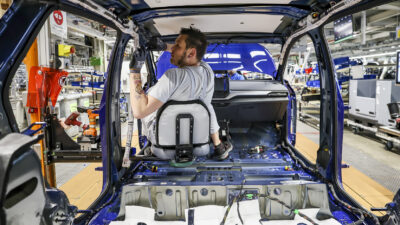STUTTGART, Germany — Upon arrival in southwestern Germany’s Stuttgart region, you can’t help but notice how proudly the community boasts of its automotive heritage.

And as well it should. Stuttgart is the birthplace and home of Gottlieb Daimler, who pioneered internal combustion engines, and the headquarters of two auto powerhouses: Mercedes-Benz and Porsche.
Fans of the local Bundesliga soccer team purchase tickets to the Mercedes-Benz Arena, and locals don’t bat an eye when a prototype model wrapped in camouflage vinyl rolls down neighborhood streets.
However, these days, the Mercedes-Benz production plant, located 12 miles south of Stuttgart in the suburban town of Sindelfingen, is unrecognizable to previous generations of autoworkers.
The electromobility revolution has pushed many traditional employees out of the workforce and replaced them with robotics performing bodywork. Those still working there must learn new, high-tech skills to keep the electric motors running.
Automakers in Germany have set ambitious goals to pivot to electric vehicles and cleaner energy over the next decade to meet global climate change initiatives. The shift is particularly felt by workers, many of whom must either learn new skills to work in an increasingly digitized and automated work environment, or opt for early retirement.
Germany has committed to a “climate-neutral mobility goal” by 2050. According to the national automotive industry association VDA, carmakers and their suppliers are investing €220 billion ($239 billion) in climate-neutral research-and-development efforts through 2026, plus €100 billion ($109 billion) in upgrading manufacturing plants.
For many of Germany’s major auto companies, 2022 was a boom year for electric vehicle sales.
BMW, based in Munich, sold more than 215,000 EVs last year, more than double their sales in 2021, said board chairman Oliver Zipse during an annual earnings conference this past March. Meanwhile, battery electric vehicles will make up 15% of all BMW sales in 2023; by 2026, they’ll make up a full one-third of sales, he forecast.
The electro-mobility transition has shifted the German automakers’ workforce from predominantly production-focused to build and support combustion engine-run machines, to one centered around information technology (IT) and digital skills.
The results are already stark: According to VDA, about 786,000 people were employed in the nation’s automobile industry in 2021. Within the next three years, at least 178,000 workers will be affected by the electro-mobility transformation. By 2030, at least 215,000 jobs – over 27% of the 2021 employment rate – will be affected.
Nearly 760,000 workers will have to be retrained. Some may move into related technology fields, such as battery or semiconductor manufacturing for electric vehicles and other uses, said Ferdinand Dudenhoeffer, director of the nonprofit Center for Automotive Research.
But not all such employees will choose to move to a brand-new field after decades of working in the combustion engine auto industry, he told Postindustrial in a recent interview.
“My feeling is, for people above 50-55 [years] or so, it will be difficult to go into a new branch,” said Dudenhoeffer.
Many end up choosing an early retirement package – agreeing to a reduced public pension payout if their company provides the difference – rather than develop a new skill set. Part of this decision may be due to the fact that Germans “don’t move like Americans,” he added, as older workers are less likely to take on a new job if it requires relocation.
The electro-mobility transition will particularly affect auto part suppliers. Of the approximately 645,000 jobs in power-train production at European suppliers, a good 500,000 – about 79% – could be lost by 2040, VDA said. About half of those might be substituted by new jobs building electric drive trains instead.
Germany’s automakers are increasingly seeking IT positions, as software becomes more and more integrated into every vehicle, said Oliver Falck, director of the Ifo Institute for Economic Research’s Center for Industrial Organization, based in Munich.
“Production” positions are becoming less and less critical, as an electric vehicle requires about one-tenth of the parts of a car with a combustion engine, he noted.
This transition is laid bare on the Mercedes-Benz webpage for job vacancies at the Sindelfingen plant. Across 30 pages of openings lay dozens of requests for developmental engineers to assist in testing electric vehicles or building electric powertrain systems, and searches for candidates with a “Doctorate in the field of e-drive for predictive diagnostics based on AI-supported algorithms.”
For many companies, and particularly the small- to medium-sized suppliers, the financial and personnel resources required to retrain their employees present a considerable challenge.
![]()
In 2021, BMW launched an extensive, multimillion-euro training initiative meant to diversify its workforce’s skill sets. In 2022, the training initiatives focused on electrics and electronics, data analytics, and artificial intelligence, according to the company’s 2022 group report.
BMW also expanded its global vocational training program to include courses on augmented reality and the Internet of Things. About 1 million personnel took part in BMW’s training initiatives in 2022, per the report.
Continental AG, an automotive parts manufacturer headquartered in Hanover, established its own training institute in 2019, the company said in an email. By the end of 2022, more than 8,500 participants had obtained qualifications in robotics, virtual and augmented reality, 3D printing, and agile models and digital skills.
In 2022, Continental increased its number of software and IT specialists to about 21,000 workers worldwide – over 2,000 more than in 2021, per the company.
Companies are also investing in modern, AI-powered manufacturing processes to make up for the projected labor deficiencies. BMW is employing more automated manufacturing processes and artificial intelligence in its factories, to counter the increasing labor costs and “scarce resource” of highly qualified personnel, said Ilka Horstmeier, the company’s human resources and labor relations director.
The investments for this electro-mobility transition rest almost completely on the German auto industry. Under the European Commission’s competition policy, EU member states cannot provide aid to their industrial partners in any way that would offer an advantage over their neighbors’ industries.
One way that governments can support the electro-mobility transition is by underwriting basic research that would benefit all EU companies – such as expanding European semiconductor production or battery techniques.
Until the end of 2022, Germany provided subsidies to any citizen who procured an all-electric or hybrid vehicle, irrespective of which company they bought from, the Ifo Institute’s Falck explained.
“You’d get the subsidy if you bought a Tesla or a Renault,” he said.
The government also supports the electro-mobility transition largely by investing in re-education and training programs. In 2022, the German Federal Employment Agency budgeted €1.3 billion for training programs across all sectors, and €1.7 billion is budgeted for 2023.
The agency was not able to share to what extent those programs were supporting the automotive sector, but noted in an email that employees in the automotive, aerospace or shipbuilding professions “received significantly more support than in the comparable periods of previous years.”
Between March and August 2022, 15 continuing education networks specifically for companies in the vehicle and supplier industry were launched, with support from the German government, per the VDA.
But Dudenhoeffer, of the Center for Automotive Research, expressed skepticism regarding the success of such programs.
“My personal feeling is, sometimes this re-education [effort] is a money-making process,” he said. As a resident of Bochum – a longtime steel and mining town in western Germany – he saw how workers laid off during the closure of General Motors’ Opel plant in 2014 took part in monthslong “retraining” efforts, but few emerged with new employment.
Two recent major events – the COVID-19 pandemic that began in 2020 and Russia’s invasion of Ukraine in early 2022 – continue to impact Germany’s electromobility ambitions.
The first weeks of the war in Ukraine were full of uncertainty about the industry impact of sanctions on Russian, the VDA shared. At that time, there were “isolated incidents” of production cutbacks; in some instances, assembly lines were brought to a halt.
But automakers recovered quickly, Falck said, by channeling “the most sparse components” – such as semiconductors – into the models with high-profit margins, namely hybrid and electric vehicles.
Despite the commitment to battery-electric vehicles, German automakers have lobbied for the EU and federal governments to continue to allow combustion vehicles on the road past the desired deadline.
This past March, Berlin succeeded in including a loophole in the EU’s green transportation legislation that would allow for the continued sale of combustion engine cars powered by lower emission, synthetic “e-fuels” after 2035, after threatening to rupture the deal at the 11th hour.
The effort shows that despite German automakers’ vocal commitment to an eventual all-electric future, the current goalposts still appear too ambitious.
“Even in road transport, the path to climate neutrality inevitably leads to the use of considerable quantities of electricity-based e-fuels and advanced biofuels,” the VDA said.







